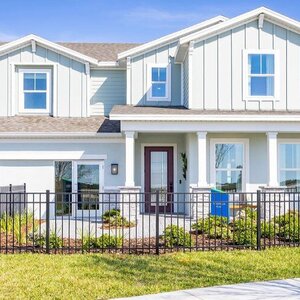The WPJ
THE WORLD PROPERTY JOURNALReal Estate Facts Not Fiction
Residential Real Estate News

Early-Stage Mortgage Delinquencies Exceed Great Recession Levels in U.S.
Residential News » Irvine Edition | By Michael Gerrity | July 14, 2020 8:00 AM ET
According to CoreLogic's latest Loan Performance Insights Report for April 2020, 6.1 percent of U.S. mortgages were in some stage of delinquency (30 days or more past due, including those in foreclosure). This represents a 2.5-percentage point increase in the overall delinquency rate compared to March 2020, when it was 3.6 percent.
To gain an accurate view of the mortgage market and loan performance health, CoreLogic examines all stages of delinquency, including the share that transition from current to 30 days past due. In April 2020, the U.S. delinquency and transition rates, and their year-over-year changes, were as follows:
The CARES Act provided forbearance for borrowers with federally backed mortgage loans who were economically impacted by the pandemic. Borrowers in a forbearance program who have missed a mortgage payment are included in the CoreLogic delinquency statistics, even if the loan servicer has not reported the loan as delinquent to credit repositories. Early-stage delinquencies (30-59 days past due) reached its highest level in at least 21 years in April. With home prices expected to drop 6.6percent by May 2021, thus depleting home equity buffers for borrowers, we can expect to see an increase in later-stage delinquency and foreclosure rates in the coming months.
"The resurgence of COVID-19 infections across the country has created economic uncertainty and leaves those who are unemployed concerned with their ability to make monthly mortgage payments," said Dr. Frank Nothaft, chief economist at CoreLogic. "The latest forecast from the CoreLogic Home Price Index predicts prices declining in all states through May 2021, erasing some home equity and increasing foreclosure risk."
All states logged increases in overall delinquency rates in April. New York and New Jersey were both hot spots for the virus and experienced the largest overall delinquency gains of 4.7 and 4.6 percentage points respectively in April, compared to one year earlier. Nevada, Florida and Hawaii were hit hard by the collapse in business travel and tourism, posting spikes of 4.5, 4.0 and 3.7 percentage points, respectively.
On the metro level, tourism destinations such as Miami, Florida (up 6.7 percentage points); Kahului, Hawaii (up 6.2 percentage points); New York, New York (up 5.5 percentage points); Atlantic City, New Jersey (up 5.4 percentage points) and Las Vegas, Nevada (up 5.3 percentage points), led the nation in overall delinquency gains.
"Despite the scale and suddenness of the pandemic, mortgage delinquency has yet to emerge as a major issue, thanks to government COVID-19 relief programs and other housing finance industry efforts," said Frank Martell, president and CEO of CoreLogic. "As the true impact of the economic shutdown during the second quarter of 2020 becomes clearer, we can expect to see a rise delinquencies in the next 12-18 months -- especially as forbearance periods under the CARES Act come to a close."
To gain an accurate view of the mortgage market and loan performance health, CoreLogic examines all stages of delinquency, including the share that transition from current to 30 days past due. In April 2020, the U.S. delinquency and transition rates, and their year-over-year changes, were as follows:
- Early-Stage Delinquencies (30 to 59 days past due): 4.2 percent, up from 1.7 percent in April 2019.
- Adverse Delinquency (60 to 89 days past due): 0.7 percent, up from 0.6 percent in April 2019.
- Serious Delinquency (90 days or more past due, including loans in foreclosure): 1.2 percent, down from 1.3 percent in April 2019. For the fifth consecutive month, the serious delinquency rate remained at its lowest level since June 2000.
- Foreclosure Inventory Rate (the share of mortgages in some stage of the foreclosure process): 0.3 percent, down from 0.4 percent in April 2019. This is the lowest foreclosure rate for any month since at least January 1999.
- Transition Rate (the share of mortgages that transitioned from current to 30 days past due): 3.4 percent, up from 0.7percent in April 2019. This marks the highest transition rate since at least January 1999. In January 2007, just before the start of the financial crisis, the current- to 30-day transition rate was 1.2 percent, while it peaked in November 2008 at 2 percent.
The CARES Act provided forbearance for borrowers with federally backed mortgage loans who were economically impacted by the pandemic. Borrowers in a forbearance program who have missed a mortgage payment are included in the CoreLogic delinquency statistics, even if the loan servicer has not reported the loan as delinquent to credit repositories. Early-stage delinquencies (30-59 days past due) reached its highest level in at least 21 years in April. With home prices expected to drop 6.6percent by May 2021, thus depleting home equity buffers for borrowers, we can expect to see an increase in later-stage delinquency and foreclosure rates in the coming months.
"The resurgence of COVID-19 infections across the country has created economic uncertainty and leaves those who are unemployed concerned with their ability to make monthly mortgage payments," said Dr. Frank Nothaft, chief economist at CoreLogic. "The latest forecast from the CoreLogic Home Price Index predicts prices declining in all states through May 2021, erasing some home equity and increasing foreclosure risk."
All states logged increases in overall delinquency rates in April. New York and New Jersey were both hot spots for the virus and experienced the largest overall delinquency gains of 4.7 and 4.6 percentage points respectively in April, compared to one year earlier. Nevada, Florida and Hawaii were hit hard by the collapse in business travel and tourism, posting spikes of 4.5, 4.0 and 3.7 percentage points, respectively.
On the metro level, tourism destinations such as Miami, Florida (up 6.7 percentage points); Kahului, Hawaii (up 6.2 percentage points); New York, New York (up 5.5 percentage points); Atlantic City, New Jersey (up 5.4 percentage points) and Las Vegas, Nevada (up 5.3 percentage points), led the nation in overall delinquency gains.
"Despite the scale and suddenness of the pandemic, mortgage delinquency has yet to emerge as a major issue, thanks to government COVID-19 relief programs and other housing finance industry efforts," said Frank Martell, president and CEO of CoreLogic. "As the true impact of the economic shutdown during the second quarter of 2020 becomes clearer, we can expect to see a rise delinquencies in the next 12-18 months -- especially as forbearance periods under the CARES Act come to a close."
Sign Up Free | The WPJ Weekly Newsletter
Relevant real estate news.
Actionable market intelligence.
Right to your inbox every week.
Real Estate Listings Showcase
Related News Stories
Residential Real Estate Headlines
- Las Vegas Area Home Prices Uptick 4.3 Percent Annually in March
- Single-Family Rent Growth in U.S. Trends Upward in 2025
- U.S. Mortgage Rates Tick Down Post Trump Tariffs Commencement
- President Trump's 'Liberation Day' Tariffs Potential Impact on the U.S. Housing and Mortgage Markets
- Baby Boomers Biggest Cohort of U.S. Home Buyers in 2025 as Millennials Decline
- U.S. Monthly Housing Payments Hit Record High in 2025
- U.S. Pending Home Sales Uptick in February
- Global Prime Residential Rent Slowdown Continued in Late 2024
- Ireland Home Price Inflation Hits 8 Year High in Early 2025
- Existing Home Sales in America Uptick in February
- Great Miami Area Residential Sales Decline 15 Percent Annually in February
- Mortgage Rates Uptick in Mid-March, Ending 9-Week Decline in U.S.
- World Property Ventures Builds the Future of Real Estate with New Funding Round
- U.S. Builder Sentiment Declines Amid Economic Uncertainty and Rising Costs
- Black Homeownership Rates in U.S. Enjoy Largest Annual Increase of All Racial Groups
- Wealthy Renters Are Taking Over More of the U.S. Rental Market
- If U.S. Congress Does Not Extend NFIP Soon, Thousands of Daily Home Closings Impacted
- U.S. Mortgage Applications Spike 11 Percent in Early March
- Greater Palm Beach Area Residential Sales Rise in Early 2025
- New Apartments in U.S. Are Leasing at Slowest Pace on Record
- U.S. Mortgage Rates Drop to 4 Month Low in March
- Overall U.S. Mortgage Delinquency Rates Dip in December
- New Tariffs on Canada, Mexico to Impact U.S. Homebuilder Input Costs
- Monaco's Property Market: A Tale of Two Cities
- U.S. Home Purchase Cancellations Surge, 1 in 7 Sales Getting Canceled
- U.S. Pending Home Sales Hit Historic Low in Early 2025
- Greater Miami Area Residential Sales Dip in January
- Governor DeSantis Supports Ending Property Taxes in Florida
- WPV Aims to Become the Berkshire Hathaway of Real Estate Tech
- U.S. Home Sales Slump Continues in January
- Average Americans Spend 38 Percent of Monthly Income on Mortgage Payments
- Switzerland's Safe-Haven Appeal Grows with World's Wealthy Homebuyers
- U.S. Builder Confidence Rapidly Declines in February
- Las Vegas Home Sales Rise 6.7 Percent Annually in January, Condo Sales Dip
- Homebuyer Demand in America Drops to 5-Year Low in Early 2025
- Ownership More Affordable Than Renting in Most U.S. Markets
- The World's First Global Listings Service Launches, Called a GLS
- Home Prices Continue to Rise in 89 Percent of U.S. Metros in Late 2024
- Global Luxury Residential Prices Showed Gradual Improvement in Late 2024
- U.S. Construction Hiring Rate Drops to Lowest Levels in 5 Years
Reader Poll
Marketplace Links
This website uses cookies to improve user experience. By using our website you consent in accordance with our Cookie Policy. Read More





